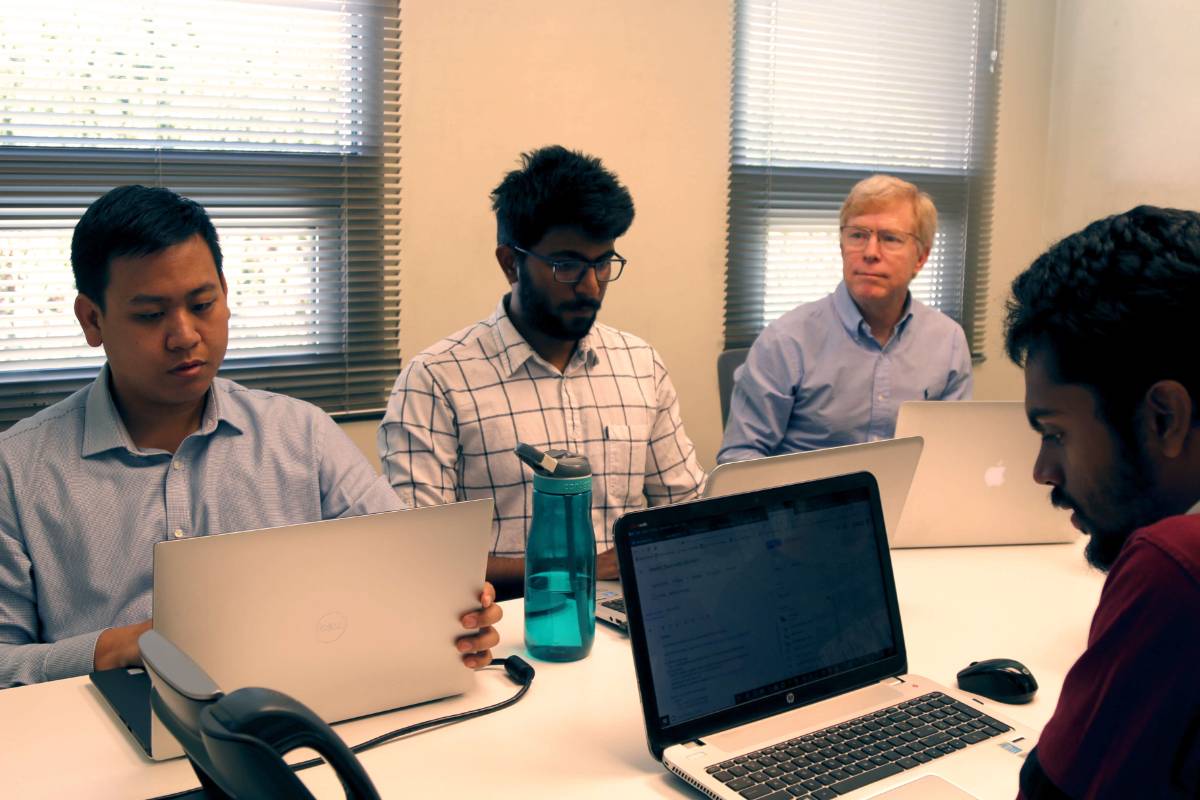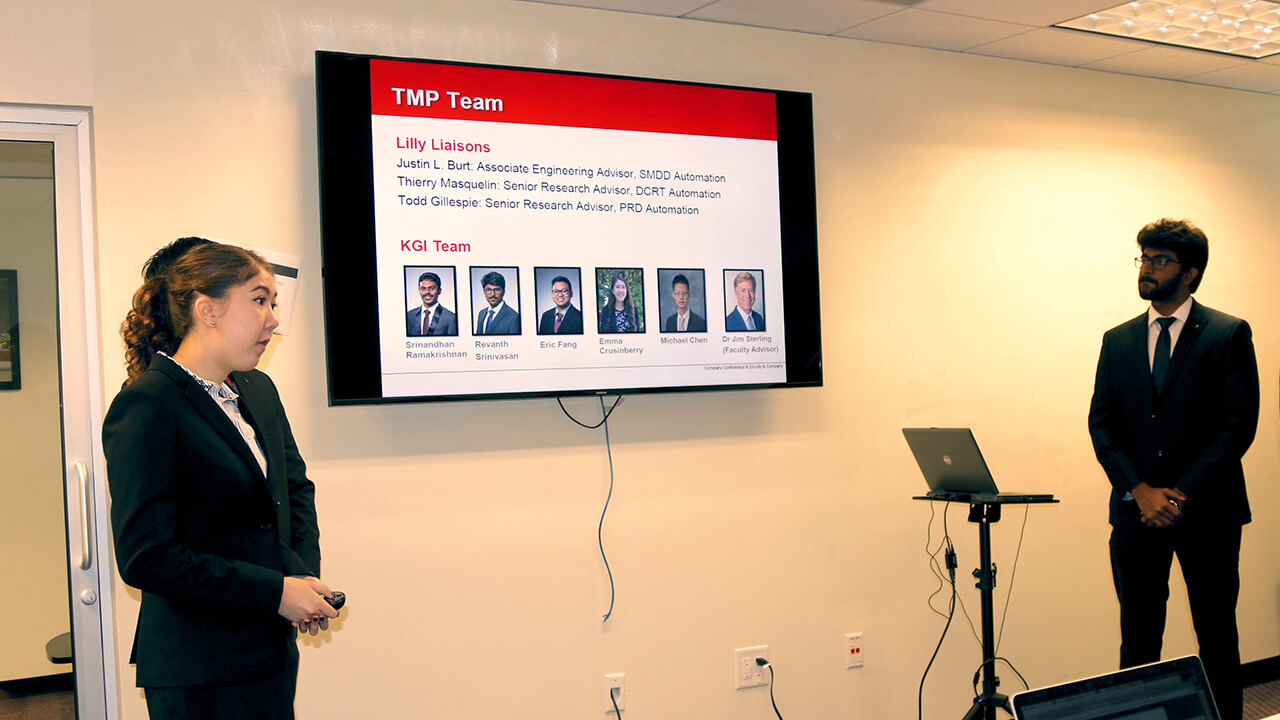TMP Case Study 2018-19
he Team Master’s Project (TMP) at Keck Graduate Institute is a degree requirement for several degree programs in the Henry E. Riggs School of Applied Life Sciences. The TMP provides students an opportunity to tackle real-life industry problems or opportunities as, essentially, a consulting team for a company.

Lilly TMP: October-November 2018 Progress
KGI will be following the TMP team working with global pharmaceutical firm Eli Lilly & Company throughout the year to showcase monthly progress and development, illuminate the inner-workings of a TMP, and watch how students develop professionally and personally.
The Lilly TMP team kicked off its year-long project on September 14, 2018. The goal? To help Lilly develop a Holistic Laboratory Automation Strategy. Specifically, the five-member KGI team will conduct a review of the current life science lab automation landscape. From this effort, critical strategic attributes of well-integrated automation systems will be defined. Additionally, landscaping should identify emerging lab automation technologies, especially those incorporating “intelligent” automation.
Accomplishments during the first six weeks:
"Going into the project, our team did not have a very firm grasp on the nuances of lab automation. But through our secondary research, we have begun to understand the competitive landscape of the project."
Michael C, student
"The most significant thing we have accomplished within the last six weeks was to create surveys for different functional roles. That is, specific sets of survey questions have been developed for upper management stakeholders (senior directors or VP-level individuals), leaders of lab automation teams (directors or scientific group leaders), and direct users of lab automation (scientists, engineers, and technicians). By interviewing different functions, we can gain the broader perspective needed to propose a holistic lab automation strategy for Lilly."
Eric F, student
"I would say the most significant accomplishment these past six weeks has been our sense of teamwork. We have great communication, and we’ve created a sense of camaraderie within the group."
Emma C, student
Professional and personal developments during the first six weeks:
"I am a very good team player and my one semester experience with a TMP last year has made it easier to settle down in the team. I have allocated more time to the TMP than I used to since the work is a bit more demanding. In addition to this, I have been taking the internal deadlines more seriously to get the work done in time so that I have enough time to help others in need."
Revanth S, student
"Being the team calendar coordinator, I have to schedule—and re-schedule—a lot of events. Even though there are fewer than 10 of us on the extended team of KGI and Lilly, it can become very confusing. I have learned to organize all the events on a weekly basis, using a Google calendar to keep track of invitations to both KGI and Lilly teams. I also learned to send the invites at least a week in advance so if there are any mix ups, there is plenty of time remedy the confusion."
Eric F, student
"Coming into this TMP as an undergraduate student majoring in biology, I felt like the least experienced member of the group. Thanks to my team’s endless kindness and helpfulness, I have learned tons about laboratory automation, research protocols, and especially about business in general."
Emma C, student
The team has learned a lot about the various players in lab automation. They have completed some secondary research and learned what kinds of automation technologies fall out-of-scope for this project. The Lilly liaisons are wonderful and provide very good weekly feedback to ensure students are on-track. The upcoming several weeks will be very important to ensure that the students can collect important data through surveys and interviews of providers and users. This will offer them a sound understanding of the way automation is currently used in pharma—important as a baseline for the rest of the project.
Jim Sterling, Faculty Advisor

Lilly TMP: December 2018 Progress
We are tracking the life cycle of the Lilly Team Master’s Project from September 2018 through May 2019. How does the project unfold as the team moves through its milestones and deliverables? What problems or opportunities are discovered along the way? How do students develop?
We have already reviewed the early phase of this project and now focus on team and project status as the fall semester winds down.
By late autumn 2018, the Lilly TMP team had progressed on a variety of fronts, narrowing in on semester deliverables and planning spring work.
These accomplishments were reflected in its fall faculty panel presentations. These 20 minute talks are delivered by each team to a rotating panel of KGI faculty members. Faculty provide written and verbal feedback as well as challenges to each TMP group.
As the Lilly team has delivered against plan, it has also evolved—evolution powered by events both planned and unplanned.
Here is a sampling of surprising things that occurred between the early days of the project and the team’s Fall Faculty Panel presentation:
“One surprising thing that happened is discovering how difficult it was to find secondary research! Many companies do not want to publish their research, so it is challenging to find information available in the pre-competitive space. Finding papers that are recent and that fit the application areas provided by the liaisons proved to be daunting.”
Michael C, student
“One surprising thing that happened is how quickly our understanding of the automation landscape developed. In just a few months I went from knowing absolutely nothing about laboratory automation, to having a good understanding of the field and Lilly’s competitors. It was amazing to see how our research efforts paid off.”
Emma C, student
“I was surprised how our team was better able to interact and give effective inputs to the liaisons on the technical as well as business aspects of the project. Our research has enabled us to develop an eye for detail with respect to laboratory automation, something that would be a definite value-add in the area of R&D operations.”
Sri R, student
“One surprising thing that I thought happened was that even though we may not know constantly what each other is doing, we always pull through and deliver something as high level as the faculty presentation when the time is right.”
Eric F, student